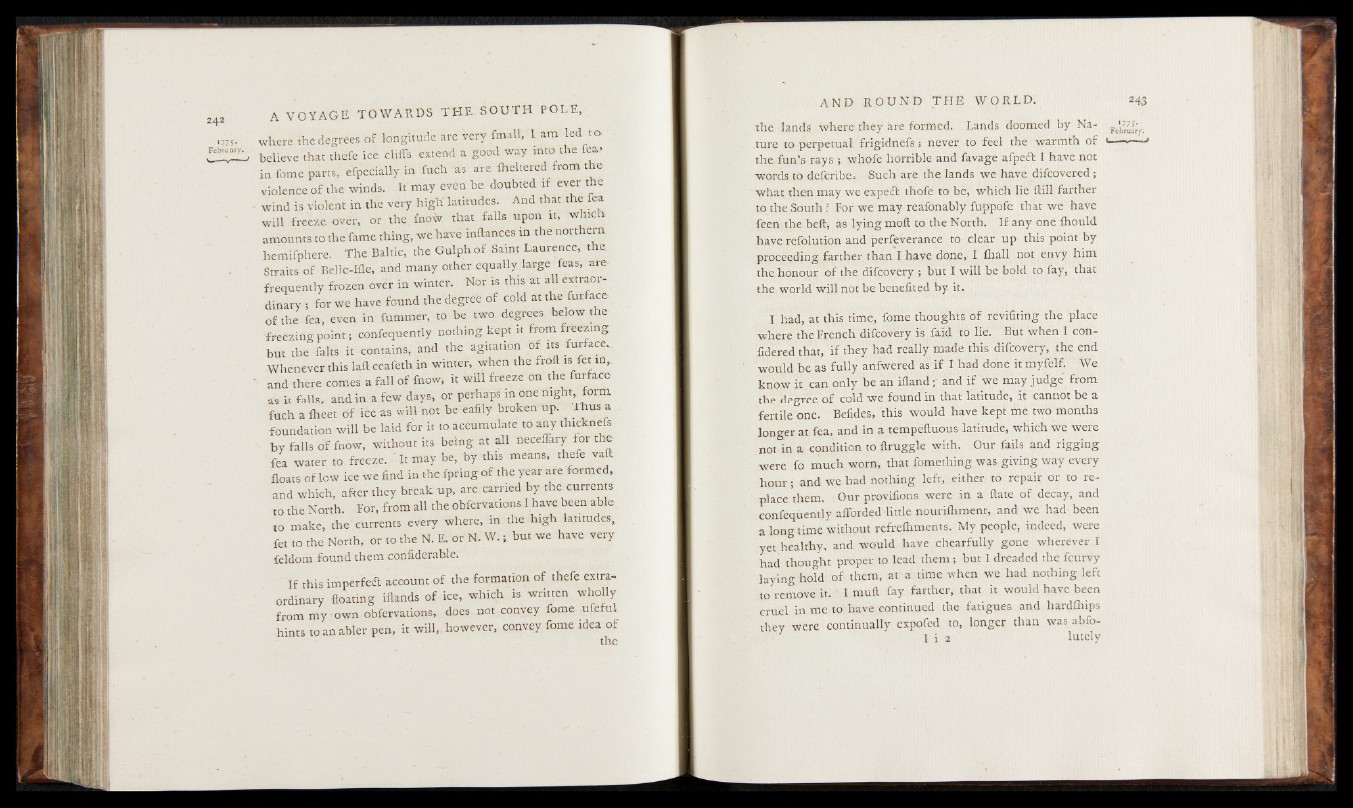
A V O Y A G E TOW 242 ARDS TH E SOUTH POLE,
1775- where the degrees of longitude are very fa u lt I am led to
believe that thefe ice cliffs extend a good way into the lea-
in fome parts, efpecially in fuch as are flieltered from the
violence o f the winds. It may even be doubted if ever the
wind is violent in the very high latitudes. And that the fea
will freeze over, or the fnow that falls upon it, which
amounts to the fame thing, we ha-ve inftances in the northern
hemifphere. The Baltic, the Gulphof Saint Laurence, the
' Straits of Belle-Ifle, and many other equally large feas, are
frequently frozen over in winter. Nor is this at all extraordinary^
for we have found the degree of cold at the furface
of the fea, even in fummer, to be two degrees below the
freezing point; confequemly nothing kept it from freezing
but the falts it contains, and the agitation of its farface.
Whenever this laft ceafeth in winter, when the froft is fet in,.
‘ and there comes a fall of fnow; it will freeze on the furface
as it falls, and in a few days, or perhaps m one night, form
fuch a fheet of ice as will not be'eafily broken'up. Thus a
foundation will be laid for it to accumulate to any thicknefs
by falls of fnow, without its being at all neceffary for the
fea water to freeze. ' It may be, by this means, thefe vaft
floats of low ice we find in the fpring o f the year are formed,
and which, after they break up, are carried by the currents
to the North. For, from all the obfervations I have been able
to make, the currents every where, in the high latitudes,
fet to the North, or tothe N. E. or N. W .b u t we have very
feldom found them confiderahle.
If this imperfedt account of the formation of thefe extraordinary
floating iftands of ice, which is written wholly
from my-own obfervations, does not convey fome ufeful
hints to an abler pen, it will, however, convey fome idea of
the
the lands where .they are formed. Lands doomed by Na- Je*£7S-^
ture to perpetual frigidnefs; never to feel the warmth of *- - - J
the fun’s rays ; whofe horrible and favage afpcct I have not
words to defcribe, Such are the lands we have difcovered;
what then may we expedi thofe to be, which lie Hill farther
to the South ? For we may reafonably fuppofe that we have
feen the belt, as lying mod to the North. If any one fliould
have refolution and perfeverance to clear up this point by
proceeding farther than I have done, I fhall not envy him
the honour of the difcovery ; but I will be bold to fay, that
the world will not be benefited by it.
I had, at this time, fome thoughts of revifiting the place
where the French difcovery is faid to lie. But when I con-
fidered that, if they had really made this difcovery, the end
would be as fully anfwered as if I had done it myfelf. We
know it can only be an illand • and if we may judge from
the degree of cold we found in that latitude, it cannot be a
fertile one. Befides, this would have kept me two months
longer at fea, and in a tempeftuous latitude, which we were
not in a condition to ftruggle with. Our fails and rigging
were fo much worn, that fomething was giving way every
hou r; and we had nothing left, either to repair or to replace
them. Our provifions were in a ftate of decay, and
confequently afforded little nourilhment, and we had been
a long time without refrefhments. My people, indeed, were
yet healthy, and would have chearfully gone wherever I
had thought proper to lead them ; but 1 dreaded the fcurvy
laying hold of them, at a time when we had nothing left
to remove it. ' I mud fay farther, that it would have been
cruel in me to have continued the fatigues and hardfliips
they were continually expofed to, longer than was abfo-
I i 2 lutely
I j. K